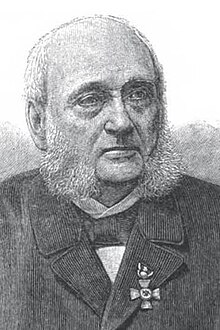Johann Gustav Schweikert
Johann Gustav Schweikert (born January 3, 1816 in Grimma ; † March 21, 1903 in Breslau ) was a German physician and homeopath.
Life
Johann Gustav Schweikert was a son of Georg August Benjamin Schweikert and his third wife Christiane Wilhelmine Spilke. He had attended the Princely School in Grimma from 1829 to 1835. On May 26, 1835, he enrolled at the University of Leipzig to study medicine. In addition, he attended the lectures on general, special and comparative anatomy, physiology, pathology, chemistry, physics with Gustav Theodor Fechner (1801–1887), botany, zoology as well as logic and metaphysics. In addition, he became an assistant to his anatomy teacher Ernst Heinrich Weber (1795–1878) and had the opportunity to take part in the courses there in his father's sanatorium.
In 1837 he followed his father and moved to the University of Breslau , where he matriculated on April 22nd. Here he attended, among other things, the lectures of Traugott Wilhelm Gustav Benedict (1785–1862), under which he dealt with ophthalmology and surgery. In addition, he attended lectures on pediatrics, nutritional therapy, obstetrics, forensic medicine, psychology, pharmacology and toxicology, mineralogy, history of medicine as well as therapy and pathology, fever and syphilitic diseases. On April 18, 1838, he enrolled in the register of the Friedrich-Wilhelms-Universität in Berlin .
There he worked at the medical and surgical facilities and followed the events of the obstetric-pediatric, ophthalmological and forensic institutes. After defending his work De Amaurosi (On Blindness), he received his doctorate in medicine on July 3, 1839. After taking the state examination, he returned to Breslau in 1840 to assist his father in his practice. In 1850 he set up his own practice in Breslau, he joined the Central Association of Homeopathic Doctors in Germany and was a member of the Free Association of Homeopathic Doctors in Leipzig.
On November 1st, 1857 he was accepted into the Imperial Leopoldine-Carolinian German Academy of Natural Scientists and he is a co-founder of the Association of Silesian Homeopathic Doctors. In 1878 he was appointed medical adviser by Kaiser Wilhelm I and in 1890 he was awarded the Red Eagle Order 4 class by Kaiser Wilhelm II . Schweikert worked in his profession until old age and died after a short illness. His body was buried in the St. Christopher's cemetery in Breslau, which no longer exists today. He left his entire library and a sum of 1,000 marks to the Central Association of Homeopathic Doctors.
Schweikert was not like his father a representative of the pure school of homeopathy according to Hahnemann's basic principles. In this he clearly distinguishes himself in his writings. Rather, he combined homeopathy with the scientific knowledge of his time. He tried to establish a more developed homeopathy as the perfecting of medicine. In his work he discussed possible causes of diseases and tried to find homeopathic therapy options and prophylactic measures, especially against the cholera disease.
Schweikert was married twice. On August 28, 1849, he married Maria Amalie Henriette Jäschke, the second daughter of the businessman Johann August Wilhelm Jäschke. After his first marriage, he married Pauline Corsica. A son Friedrich Schweikert is known.
Works
- Homeopathy and its newest opponent, the modern Brownian, Doctor Finkenstein in Breslau. Wroclaw 1845
- Homeopathic adviser for cholera diseases, containing a brief description of cholera-like diseases and Asian cholera, together with an indication of the most necessary homeopathic medicines to be used for the first time. Wroclaw 1853
- The cervical cell tissue burn (Cynanche cellularis maligna) and its homeopathic treatment. In: Homeopathic Quarterly. 1862
- Cholera, an epidemic paralysis of the capillaries of the intestinal mucosa and its nerves. Wroclaw 1868
literature
- Heinrich Johannes Scheufler: Grimmaisches Ecce 1903. Publishing house of the association of former princely students, 1903, p. 25
- Wilmar Schwabe: Leipzig's popular journal for homeopathy. Self-published, Leipzig, 1897 (28th year) p. 49
- Anke Dörges: The homeopath family Dr. Schweikert. Karl F. Haug Verlag, Stuttgart, 2007, ISBN 978-3-8304-7275-9
- Fritz D. Schroers: Lexicon of German-speaking homeopaths. Verlag Karl F. Haug, Stuttgart, 2006, p. 134
Individual evidence
| personal data | |
|---|---|
| SURNAME | Schweikert, Johann Gustav |
| BRIEF DESCRIPTION | German physician and homeopath |
| DATE OF BIRTH | January 3, 1816 |
| PLACE OF BIRTH | Grimma |
| DATE OF DEATH | March 21, 1903 |
| Place of death | Wroclaw |
